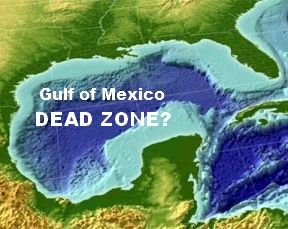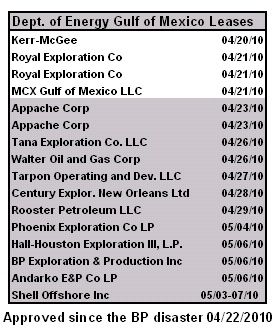| « BP needs a new logo | Big oil, government long secreted license to kill » |
Too Big to Exist - Big Oil

There is no viable solution insight for the out of control oil gusher in the Gulf of Mexico. The stunning failure of British Petroleum (BP) raises the question - are these oil giants too big to exist? Are they too dangerous to function in our presence? BP has four permanent deep water structures and 28 boreholes operating at a water depth of greater than 5000 feet in the Gulf of Mexico. What's next?
British Petroleum (BP) had the resources to drill the well but lacked the planning and ability to deal with its failure. The oil giant's performance inspired ridicule by Jon Stewart in a recent Daily Show comment ("There will be blame"). The White House was not amused, however. Nobel Prize winning physicist and Secretary of the Energy, Steven Chu, is now in Houston with a team of cutting edge scientists tasked with mentoring BP and devising a viable solution as the oil giant continues to falter.
There is a well known history of oil company accidents including blazing oil rigs, the Exxon Valdez tanker leak, and the Prudhoe Bay pipeline collapse (another BP special). But nothing matches the collapse of BP's Deepwater Horizon structure at the Macondo prospect, Gulf of Mexico.
The failed site is gushing between 200,000 and one million gallons of oil a day into the Gulf of Mexico. The Center for Biological Diversity reported that the Minerals Management Service (MMS), the federal agency that approved drilling, routinely ignored Federal biologists by issuing waivers that failed to take in to account the impact of drilling on endangered species.
Adding humans as an endangered species might be a timely move. The National Oceanic and Atmospheric Administration (NOAA) produced a document on April 28 indicating the leak could reach over two million gallons of oil a day. In addition to ravaging the Gulf of Mexico, the damage caused by oil may extend to the Florida straits and the Atlantic coast of the United States.
While BP estimates that it can contain the gusher within a week, Admiral Thad Allen of the U.S. Coast Guard is planning for the event to become a full scale catastrophe. His candid admission that half a million gallons of the toxic oil dispersant have been released above and below the gulf indicates the current level of desperation to contain the accumulating mess.
Too Big to Exist
BP is a $250 billion company, one of the six largest oil and natural gas exploration and marketing companies in the world. It's the largest corporation in the United Kingdom.
A look at its public safety record over the past five years raises questions about the ability of the company to function safely. In 2005, BP's Texas refinery had a series of explosions that killed 15 and injured 170 more people. Residents near the refinery were confined to their homes to limit toxic exposure. The U.S. Chemical Safety Board issued a thorough report laying responsibility at BP's doorstep. The company's poor maintenance of the Alaska pipeline at Prudhoe Bay due to "draconian cuts" in maintenance resulted in a major oil spill in 2006.
CNN conducted a major review of BP's challenges in light of these two disasters in 2006. Presented with evidence showing neglect of pipeline corrosion at Prudhoe Bay, Alaska the BP executive in charge claimed, "We were blindsided by the recent leaks." At congressional hearings, one BP officials invoked the Fifth Amendment to avoid "self incrimination." BP senior management promised to take the steps necessary to moderate the company's obsession with the bottom line at the expense of safety.
Despite promising to remedy the problems it created in both disasters, BP had a poor track record of keeping its promises prior to the current catastrophe.
After being chastised by President Barack Obama for creating a "ridiculous spectacle" in the midst of the crisis, BP's CEO Tony Howard tried to diminish the scope of the problem. The CEO insisted that deep sea oil drilling will continue. He's right. BP has 32 Gulf of Mexico oil operations at greater than 5000 feet.
BP is not the only oil company with a poor safety record. It's the first big oil company to cause a catastrophe of this magnitude. It must be the last. We simply can't tolerate these lumbering giants that place cost cutting for bigger executive bonuses above the safety and survival of those who use their energy products. If you put your customers out of business and injure or kill them, they can't buy anything.
We are the endangered species.
END
This article may be reproduced in whole or part with attribution of authorship and a link to this article.
No feedback yet





